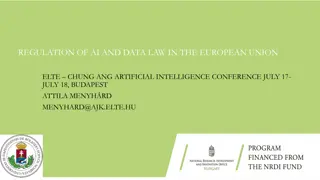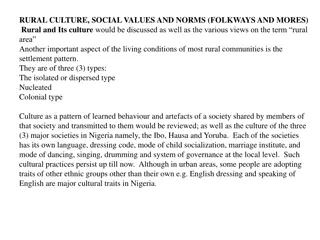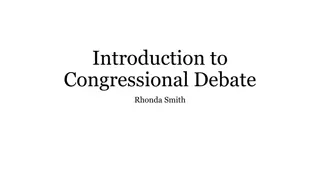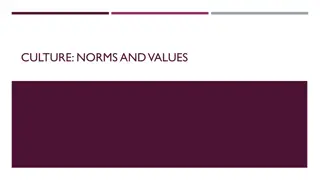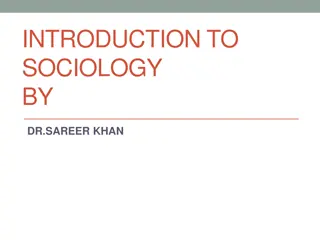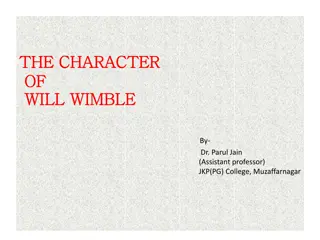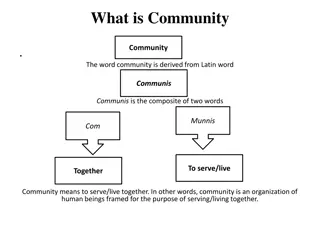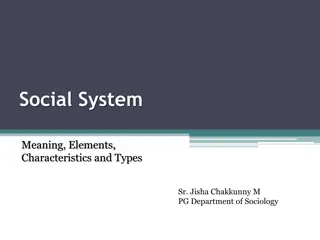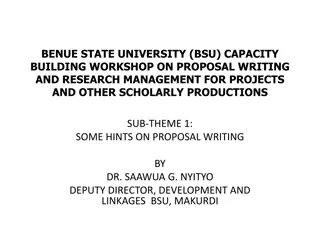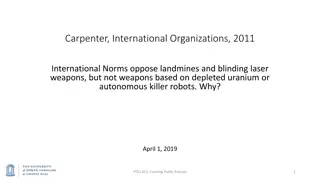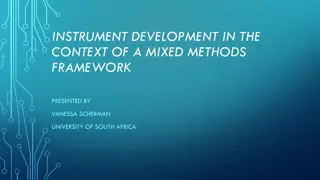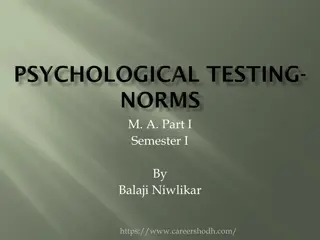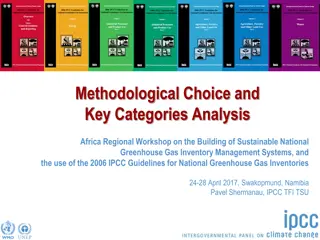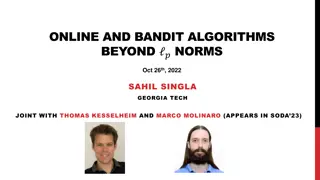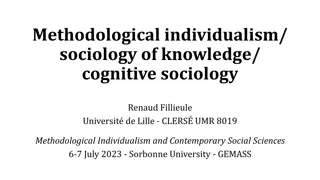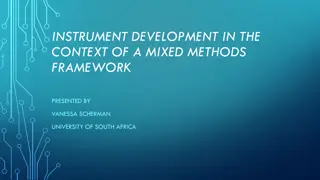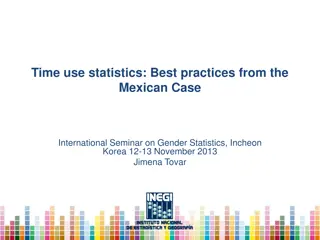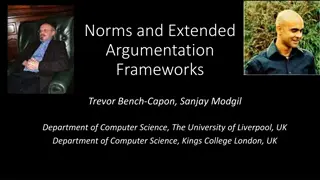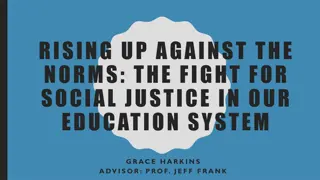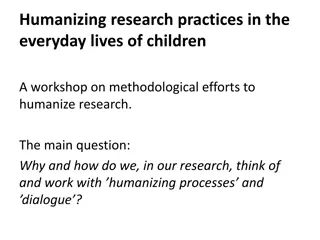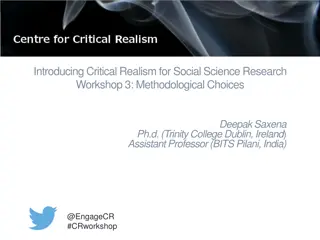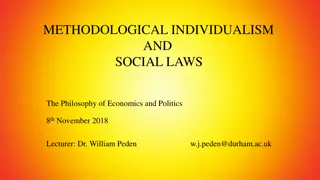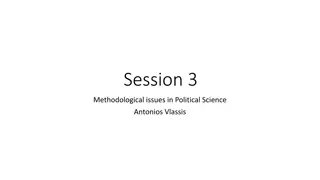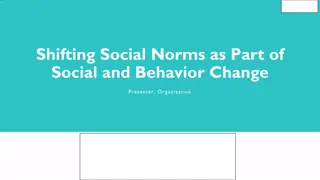Zoom Support Meeting Norms
Follow these meeting norms for Zoom support meetings: mute yourself unless speaking to the group, use chat for questions, be professional and helpful, and be mindful when asking about specific situations.
1 views • 49 slides
Team Norms Workshop Toolkit for Hybrid Work Environments
Designed for facilitating team discussions on norms in a hybrid work setup, this toolkit provides activities, discussion questions, and checklists to ensure effective communication and collaboration. Customize the slides to align with your team's needs and goals. Includes warm-up exercises, norm gen
5 views • 37 slides
Understanding Masculinity Norms in New Zealand
New Zealand faces a challenge with abusive behavior in intimate partner relationships, with one in three women experiencing abuse in their lifetime. This study delves into the impact of masculine norms on men's behaviors and help-seeking tendencies in the context of domestic abuse. Over sixty men pa
2 views • 82 slides
Challenges and Legal Framework for AI Regulation in the EU
Addressing the complexities of regulating artificial intelligence and data law in the European Union, the ELTE Chung Ang Artificial Intelligence Conference delves into the challenges requiring legal answers, the balance between regulation and law enforcement, and the evolving nature of legal norms i
2 views • 21 slides
To be or not to be – ‘insider/outsider positionality’: Methodological challenges in researching a group of Iraqi Kurdish migrants in the UK.
Research by Chra R. Mahmud explores the methodological challenges in studying Iraqi Kurdish migrants in the UK, focusing on insider-outsider positionality. The study delves into the lived experiences of this group, examining the researcher's status and identity negotiation during the research proces
0 views • 18 slides
Courses and Training on Child Welfare and Family Support
The Melograno Training Courses focus on combining scientific and methodological skills with practical experience in managing a variety of services for individuals and families. Drawing from the expertise of professionals with extensive backgrounds in psychology, social work, education, and counselin
2 views • 32 slides
Methodological Video Analysis for Research Enhancement
Explore a series of methodological videos related to topics covered in class to enhance your understanding. Identify familiar information, new insights, and unclear concepts. Engage in self-assessment exercises to further reinforce your knowledge. Conclude with a session with the instructor for feed
0 views • 11 slides
Foster Care Management and Norms in Western Cape: Legislation, Policy, and Standards
The presentation discusses the foster care management in Western Cape, focusing on legislation compliance, norms, standards, and challenges. It covers aspects like foster care orders, Canalisation SOP, human resources, child protection organizations, funding, and more. The strategic implementation o
3 views • 21 slides
Deepening Understanding of Lesson Planning for Ambitious Math Teaching
In this session of the Oregon Math Project - Ambitious Math Teaching, the focus is on planning rich lessons that engage students' rough draft thinking and maintain cognitive demand. The agenda includes setting norms, connecting to research resources, and using a Lesson Planning Framework. Participan
11 views • 52 slides
Understanding Normed Vector Spaces for Nanotechnology Engineering
Introduction to normed vector spaces, focusing on defining norms for vectors in finite-dimensional spaces, exploring different ways to measure vector length, and understanding the concept of unit vectors and norm properties. This topic equips readers with the ability to calculate vector norms, norma
0 views • 9 slides
Rural Culture, Social Values, and Norms in Nigeria
Explore the rich cultural diversity of Nigerian rural communities, focusing on settlement patterns, cultural practices of major societies (Ibo, Hausa, Yoruba), importance of culture, social values, norms, social institutions like family, religion, and government, and changes in social values over ti
0 views • 4 slides
Essentials of Congressional Debate: Rules, Procedures, and Norms
Explore the key components of Congressional Debate including the types of legislation, preparation guidelines, contest norms, and dress code expectations. Learn about bills, resolutions, and constitutional amendments, and understand the importance of courteous behavior, proper attire, and effective
0 views • 27 slides
Financial Sector Reforms in India: An Overview
In the early 1990s, India witnessed significant reforms in its financial sector, addressing issues like lack of transparency, extensive regulation, and financial repression. Key reforms included setting up expert committees, reducing SLR and CRR, implementing prudential norms, and deregulating inter
0 views • 18 slides
Understanding Cultural Norms and Values
Sociologists define culture through norms, values, beliefs, and material objects. Norms are rules that govern behavior, with three basic types: folkways, mores, and laws. Folkways are customs without moral significance, mores are norms with moral importance, and laws are clearly defined and enforced
0 views • 15 slides
Understanding Culture in Sociology: Key Concepts and Definitions
Culture is the cornerstone of society, distinguishing humans from animals and shaping our social lives. Sociologists define culture as the shared values, practices, norms, and beliefs that govern our interactions and behaviors. This comprehensive guide explores the non-material aspects of culture, i
1 views • 30 slides
Institutionalism and Methodological Issues in Political Science
Institutionalism is a foundational concept in political science, emphasizing the study of governing institutions and their role in shaping political behavior. It explores inductive and deductive approaches to research, highlighting the significance of empirical evidence and theoretical assumptions.
0 views • 19 slides
Analysis of the Character of Will Wimble by Sir Richard Steele
Sir Richard Steele's essay "The Character of Will Wimble" explores the persona of Will Wimble, a man of leisure with no specific business but known for his helpful nature and skills in handicraft. Will, a younger brother of a baronet, is portrayed as a responsible individual who assists others with
0 views • 6 slides
Understanding the Concept of Community: Definition, Elements, and Significance
The concept of community is derived from the Latin word "Communis" and holds different definitions based on scholars' interpretations. It encompasses elements such as locality, we-feeling, security, norms and values, and roles and status within society. Communities are formed for the purpose of serv
0 views • 10 slides
Understanding Social Systems: Meaning, Elements, Characteristics, and Types
Social systems are orderly arrangements of social interactions based on shared norms and values. Talcott Parsons introduced the concept in modern sociology, defining it as an interrelationship of social actors interacting based on shared cultural norms. Social systems encompass various subsystems li
2 views • 70 slides
Effective Proposal Writing: Key Strategies for Securing Funding
Proposal writing is essential in academia for securing funding. This workshop at Benue State University shed light on the importance of persuading reviewers and addressing unspoken needs of funding agencies. Key elements such as conceptual innovation, methodological rigor, and rich substantive conte
1 views • 21 slides
Understanding Conversational Analysis: Insights into Everyday Communication
Exploring the realm of conversational analysis, this text delves into the significance of natural conversation and its role in language research. Through various approaches, such as conversational analysis and discourse analysis, researchers aim to uncover the linguistic characteristics and norms of
0 views • 24 slides
International Norms and Weapons Regulation: Analyzing the Selectivity of Bans
International norms exhibit selectivity in banning certain weapons like landmines and blinding laser weapons while permitting others such as depleted uranium-based arms and autonomous killer robots. The discrepancy raises questions about ethical outrage in weapon condemnation and the role of agenda-
0 views • 12 slides
Instrument Development in the Context of Mixed Methods Framework
Explore the intricacies of instrument development within a mixed methods framework as presented by Vanessa Scherman from the University of South Africa. The overview delves into mixed methods research, methodological norms, and closing the loop in research processes. Gain insights into the pragmatic
2 views • 40 slides
Understanding Measures of Central Tendencies and Norms in Test Evaluation
Exploring topics such as measures of central tendencies (mean, median, mode), variability, understanding raw scores, standardization samples, norms in test evaluation, and types of evaluation protocols. Learn about developing norms, derived score interpretation, and the significance of evaluation me
7 views • 35 slides
Understanding Methodological Choice and Key Categories Analysis in Greenhouse Gas Inventory Management
Methodological choice and key categories analysis play a crucial role in managing uncertainties in greenhouse gas inventories. By prioritizing key categories and applying rigorous methods where necessary, countries can improve the accuracy and reliability of their emissions estimates. Key categories
0 views • 24 slides
Advanced Techniques in Online and Bandit Algorithms Beyond Norms
Delve into the realm of online and bandit algorithms beyond traditional norms as discussed by Sahil Singla from Georgia Tech in collaboration with Thomas Kesselheim and Marco Molinaro. The presentation explores the design and optimization of algorithms for online settings, shedding light on load bal
0 views • 21 slides
Exploring Methodological Individualism in Sociology of Knowledge
Delve into the concept of methodological individualism within the sociology of knowledge, as scholars like Renaud Fillieule and Raymond Boudon emphasize the importance of understanding collective beliefs through the lens of individualistic methodology. Classical works by Robert Merton further enrich
0 views • 24 slides
Understanding Group Dynamics in Team Environments
Group norms play a crucial role in shaping behavior within a team setting, whether through prescribed norms taught to new members or emergent norms that develop through group interactions. Group roles like initiator, facilitator, and agitator also impact how a team functions. Effective initiators co
0 views • 27 slides
Interviewing Young Adults with Life-Limiting Conditions: Methodological Reflections
This study reflects on the methodological aspects of interviewing young adults with life-limiting conditions, emphasizing inclusive research practices. The research employs interpretive qualitative methods, focusing on unexpected consequences of pandemic control measures. Participants, including bot
0 views • 10 slides
Instrument Development in Mixed Methods Framework by Vanessa Scherman
Mixed methods research presented by Vanessa Scherman from the University of South Africa explores the development of instruments within a mixed methods framework. The content covers an overview of mixed methods, methodological norms, instrumental development, and closing the loop. It discusses the i
0 views • 40 slides
Understanding Time Use Statistics in Mexico: Best Practices and Methodological Insights
Exploring the methodological features, surveys conducted, representativity considerations, and basic concepts underlying time use statistics in Mexico. The study focuses on how individuals allocate their time in daily activities, encompassing all types of work within households. Various surveys and
0 views • 25 slides
Norms and Practical Reasoning Frameworks in Value-Based Argumentation
Norms play a crucial role in influencing behavior through practical reasoning. Practical reasoning involves using value-based argumentation frameworks to generate and evaluate arguments, as demonstrated in the parable of the Ant and the Grasshopper. The story highlights the importance of planning fo
0 views • 15 slides
Challenging Education Norms: Towards Social Justice
The fight for social justice in the education system is imperative as flawed norms hinder progress. Recognizing gender norms in teaching, addressing racial inequalities, and navigating COVID-19 disruptions are key areas of focus. By breaking down entrenched norms, empowering students, and advocating
0 views • 31 slides
Understanding Norms and Global Governance Dynamics
Explore the complex interplay between norms, governance structures, and international tribunals in the context of global perspectives and societal behavior. Discover how norms evolve, the roles of various stakeholders, and the impact on accountability and justice in a changing world landscape.
0 views • 22 slides
Humanizing Research Practices with Children: Methodological Efforts and Critical Perspectives
Workshop focusing on humanizing research methods with children, emphasizing critical psychology theories and engaging children as active participants in research. The approach challenges traditional psychological norms, promoting dialogue and understanding children as subjects in their own lives.
0 views • 22 slides
Exploring Critical Realism for Social Science Research: Methodological Perspectives
Delve into the methodological choices and key concepts of Critical Realism for social science research, including the nature of reality, researcher-inquirer relationships, and assumptions about human agency. Learn about the domains of reality in Critical Realism and the distinction between qualitati
0 views • 10 slides
Exploring Methodological Individualism in Social Science
Critiques of invoking external agents in economics, the importance of individual behavior in explaining economic outcomes, and various interpretations of methodological individualism in social science are discussed. The focus is on explaining social phenomena through terms related to individual beli
0 views • 23 slides
Rational Choice Theory in Political Science: Methodological Insights
Rational choice theory, a prominent approach in political science since the 1970s, focuses on strategic interactions among individuals seeking to maximize their own goals. Rooted in economic tools, this theory emphasizes rational decision-making based on individual interests and preferences. Methodo
0 views • 9 slides
Advancing Social Norms in SBC Programming
Explore the nuances of social norms programming and its impact on behavior change initiatives. Delve into the strategies and evolution of shifting social norms for effective outcomes.
0 views • 56 slides
Methodological Considerations in Estimating CO2 Emissions Using EFS/LCF
Various studies have utilized the EFS/LCF in the UK to estimate household emissions and policy impacts. This involves converting expenditures into emissions, which presents methodological challenges such as infrequent purchases and variations in data sources. The comparison of household CO2 emission
0 views • 17 slides



